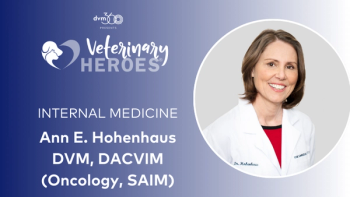
How associate veterinarians can craft an ace contract
Associates: Dont leave your contract negotiation up to chance. Understanding protectable interest and including a reasonable deferral period will get you closer to the contract you want.
Immediately after I took the New York bar exam, I decided to apply to the MBA program at New York University to pursue a specialty degree in taxation. But after attending the classes for just a few months, I realized that business school wasn't for me. I usually fell asleep during Basic Accounting. I hated the obligatory “group” projects. And what in the world is a Monte Carlo simulation anyway? So I withdrew from a fantastic business school program and headed off to private law practice.
Getty ImagesWith that in mind, imagine how bizarre it would have been if NYU's attorneys had subsequently sent me a certified letter stating the following: “Please refer to your admission letter with our School of Business, which expressly prohibits you from learning anything at any institution located in the five boroughs of New York City or any contiguous county for a period of 3 (three) calendar years. In addition, if you do learn anything within such area, you agree that we may obtain a temporary restraining order against you (and/or any complicit educational institution) and you agree to pay NYU one year's typical salary offered to an NYU Business School graduate.”
Absurd? Probably, but aren't there some striking similarities between that wacky scenario and the terminology used in many veterinary associate employment contracts? The first nutty idea in my imaginary letter is that NYU could be meaningfully injured if I had transferred to another business school. The second nutty idea is that New York University would attempt or be allowed to control my life in a powerful way when I had been “theirs” for only a couple of months.
And just ignore the nuttiest thought of all: that I would ever have the money to pay them what one of their MBA grads makes in a year at Goldman Sachs or Chase.
This example is meant to illustrate two key points, which should be considered by both veterinary hospitals and associate veterinarian applicants as they work through the employment negotiation process. First, both sides should realistically assess what is referred to in noncompete law as the employer's “protectable interest.” Second, all parties to a employment agreement would be well-served by including a reasonable one- to three-month “waiting period” that would run between the moment work begins and the point where the personal noncompete language kicks in.
Protectable interest
Employment contracts are unique in that they attempt to govern individual human behavior related to pursuit of a fundamental human need. I can sell a plot of land and the contract could specify that the buyer can't develop the land until my death. Why would I do that? It doesn't matter; maybe I like the view from the house I own across the street and want to preserve the view until my death. The point: real estate development is not a fundamental human need or right. People are free to contract away their real estate development rights as they please.
But could I sign an enforceable contract hiring the world-champion frankfurter eater to compete on my reality TV show against Germany's top hot dog glutton? Well, health is a fundamental human need, so the answer is bifurcated: The contract would probably be enforceable if the competition were for a reasonable length of time. The contract would likely be void if the competition were set to end as soon as one contestant fell into a coma due to life-threatening pancreatitis.
Similarly, when a practice seeks to restrict an associate's fundamental right to earn a living through practicing his craft, limits must be set. And they must be reasonable. But what is reasonable is subjective and the devil is in the subjectivity.
Consider this: One of my client DVMs told me recently that he was certain that any 10-mile noncompete term was unenforceable because five miles was the enforceability limit. Really? He might get an argument on that from the associate at an exclusively feline practice at the southern tip of Manhattan. She'd tell you that none of her clients would ever box up their kitty and schlep 5.1 miles on the subway to follow her to a new clinic. Her position: a five-mile noncompete would exceed her boss's protectable interest.
On the other hand, if an associate veterinarian had been working for 20 years as an oncologist (and virtual hero to thousands of clients) on the north shore of Long Island, isn't there a pretty good chance he'd have a solid following if he quit to work 10.1 miles south? His employer would almost certainly feel that his protectable interest extended beyond 10 miles.
In the first instance, five miles is probably unreasonable. In the second example, perhaps the clinic should have negotiated a noncompete radius greater than 10 miles in order to protect itself from losing substantial income when its resident cancer guru left its employ.
Playing the waiting game
How is it possible for a veterinary practice to be so certain a new associate will be a good fit that it decides it must immediately impose a substantial noncompetition contract term? Realistically, it probably isn't.
Consequently, I am a strong believer that employment contract noncompete language should include a brief but practical deferral period of the associate's commitment to abstain from competitive practice with the new employer. That means a waiting period of at least 30 days-60 to 90 days would be even better. Here are just a few reasons that justify postponing the effective date of any prohibition against personal competitive practice:
> Such provisions demonstrate goodwill to the job seeker and reduce the edginess generally associated with signing a noncompete commitment.
> If the practice finds that the associate does not “fit” its culture and team, it's much easier to let the associate go early on. There will be far less resentment and hostility on the dismissed associate's part, as his or her alternative job options are in no way reduced by having taken the job in the first place.
> The enforceability of the noncompete, once it does become effective, may be enhanced through the use of such a trial period. To a court, the noncompete term might seem more “fair and reasonable” if it does not attach until the associate actually spends enough time on the job to have bonded with a significant number of clients. A genuine protectable interest is more likely to have been successfully established in the eyes of the law.
> Some practices just don't turn out to be what they are advertised to be in terms of quality, caseload, collegiality or overarching philosophy. If that job just isn't what it was reputed to be, it serves nobody's interest to tie a disenchanted doctor into the unsuitable work environment.
Newsletter
From exam room tips to practice management insights, get trusted veterinary news delivered straight to your inbox—subscribe to dvm360.




